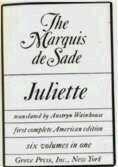Juliette (novel) (original) (raw)
From Wikipedia, the free encyclopedia
1797 novel written by the Marquis de Sade
Juliette
 Title page of 1968 translation by Austryn Wainhouse Title page of 1968 translation by Austryn Wainhouse |
|
|---|---|
| Author | The Marquis de Sade |
| Original title | L'Histoire de Juliette, ou les Prospérités du vice |
| Language | French |
| Genre | Libertine, philosophical novel |
| Publication date | 1797 |
| Publication place | France |
| Media type | Print (Hardback & Paperback) |
| Preceded by | La Nouvelle Justine |
| Followed by | The Crimes of Love (1800) |
Juliette is a novel written by the Marquis de Sade and published 1797–1801, accompanying de Sade's 1797 version of his novel Justine. While Justine, Juliette's sister, was a virtuous woman who consequently encountered nothing but despair and abuse, Juliette is an amoral nymphomaniac murderer who is successful and happy. The full title of the novel in the original French is L'Histoire de Juliette ou les Prospérités du vice, and the English title is "Juliette, or Vice Amply Rewarded" (versus "Justine, or Good Conduct Well-Chastised"). As many other of his works, Juliette follows a pattern of violently pornographic scenes followed by long treatises on a broad range of philosophical topics, including theology, morality, aesthetics, naturalism and also Sade's dark, fatalistic view of world metaphysics.
The majority of the novel is a first-person narrative in which the amoral Juliette recounts to her moral sister Justine, among other people, the events of her life.[1]: 100 Juliette is raised in a convent. However, at age thirteen she is seduced by a woman who immediately explains that morality, religion and other such concepts are meaningless. There are plenty of similar philosophical musings during the book, all attacking the ideas of God, morals, remorse, love, etc., the overall conclusion being that the only aim in life is "to enjoy oneself at no matter whose expense." Juliette takes this to the extreme and manages to murder her way through numerous people, including various family members and friends.
During Juliette's life from age 13 to about 30, the wanton anti-heroine engages in virtually every form of depravity and encounters a series of like-minded libertines. She befriends the ferocious Clairwil, whose main passion is the murder of boys and young men, as revenge for the general brutality of men toward women. She meets Saint Fond, a 50-year-old multi-millionaire who murders his father, commits incest with his daughter, tortures young girls to death on a daily basis, and even plots an ambitious scheme to provoke a famine that will wipe out half the population of France. She also becomes acquainted with Minski, a gigantic ogre-like Muscovite who delights in raping and torturing young boys and girls to death before eating them. The novel also contains several scenes of "fetishism, exhibitionism, voyeurism, sexual masochism, sexual sadism, paedophilia, zoophilia, and necrophilia", as well as horrific sexual violence.[1]: 107
Real people in Juliette
[edit]
During her tour of Europe, Juliette encounters a series of libertines, including several historical figures who are all portrayed as depraved.[1]: 99 A long audience with Pope Pius VI is one of the more extensive scenes in Juliette. The heroine repeatedly addresses the Pope by his legal name, "Braschi". She also flaunts her learning with a verbal, yet highly detailed, catalogue of alleged immoralities committed by his papal predecessors. Their conversation ends (like nearly every scene in the narrative) with an orgy, in which Pope Pius is portrayed as a secret libertine. While discussing murder, Braschi notes that cruelty is essential to pleasure, remarking that "killing is not enough, one must kill in hideous style".[1]: 107
Soon after this, the male character Brisatesta narrates two scandalous encounters. The first is with "Princess Sophia, niece of the King of Prussia", who has just married "the Stadtholder" at the Hague. This is a presumed reference to Wilhelmina of Prussia, Princess of Orange, who married the last Dutch Stadtholder, William V of Orange, in 1767, and was still alive when Juliette was published thirty years later. The second encounter is with Catherine the Great, the Empress of Russia.
Publication and reception
[edit]
Both Justine and Juliette were published anonymously. Napoleon ordered the arrest of the author, and as a result de Sade was incarcerated without trial for the last thirteen years of his life.
The essay (Excursus II) "Juliette or Enlightenment and Morality" in Max Horkheimer and Theodor Adorno's Dialectic of Enlightenment (1947) analyses Juliette as the embodiment of the philosophy of enlightenment. They write: "she demonises Catholicism as the most-up-to-date mythology—and along with it, civilisation as a whole. Her comportment is enlightened and efficient as she goes about her work of sacrilege … She favours system and consequence."[2][3]
- Justine Paris
- Juliette. Translated by Wainhouse, Austryn. 1968. OCLC 976556170.
- ^ a b c d Phillips, John (2005). The Marquis de Sade: a very short introduction. Very short introductions (First published as a Very Short Introduction ed.). Oxford: Oxford University Press. ISBN 978-0-19-280469-3.
- ^ Theodor W. Adorno & Max Horkheimer, Dialectic of Enlightenment. Translated by John Cumming. London/New York: Verso, 1999.
- ^ Roche, G. T. "Sade, Enlightenment, Holocaust".
- Full text of Juliette Archived 2007-09-12 at the Wayback Machine, in French
- "Marquis de Sade – Juliette – AMEA // World Museum of Erotic Art". ameanet.org. 27 December 2016. Archived from the original on 7 May 2019.
- (in French) La nouvelle Justine, ou les malheurs de la vertu, suivie de l'Histoire de Juliette, sa soeur, vol. 5, vol. 6, vol. 7, vol. 8, vol. 9, vol. 10, en Hollande, 1797.